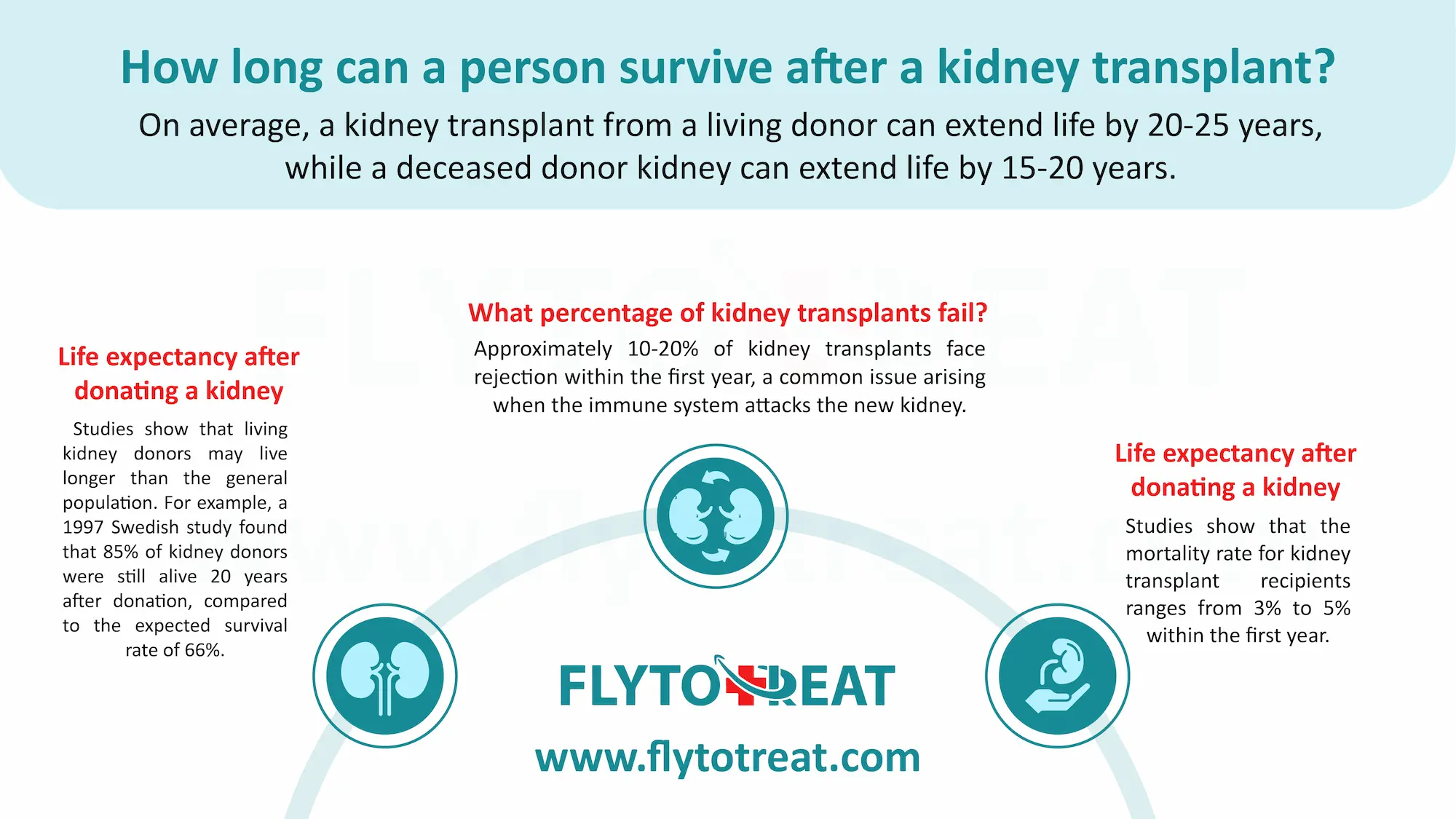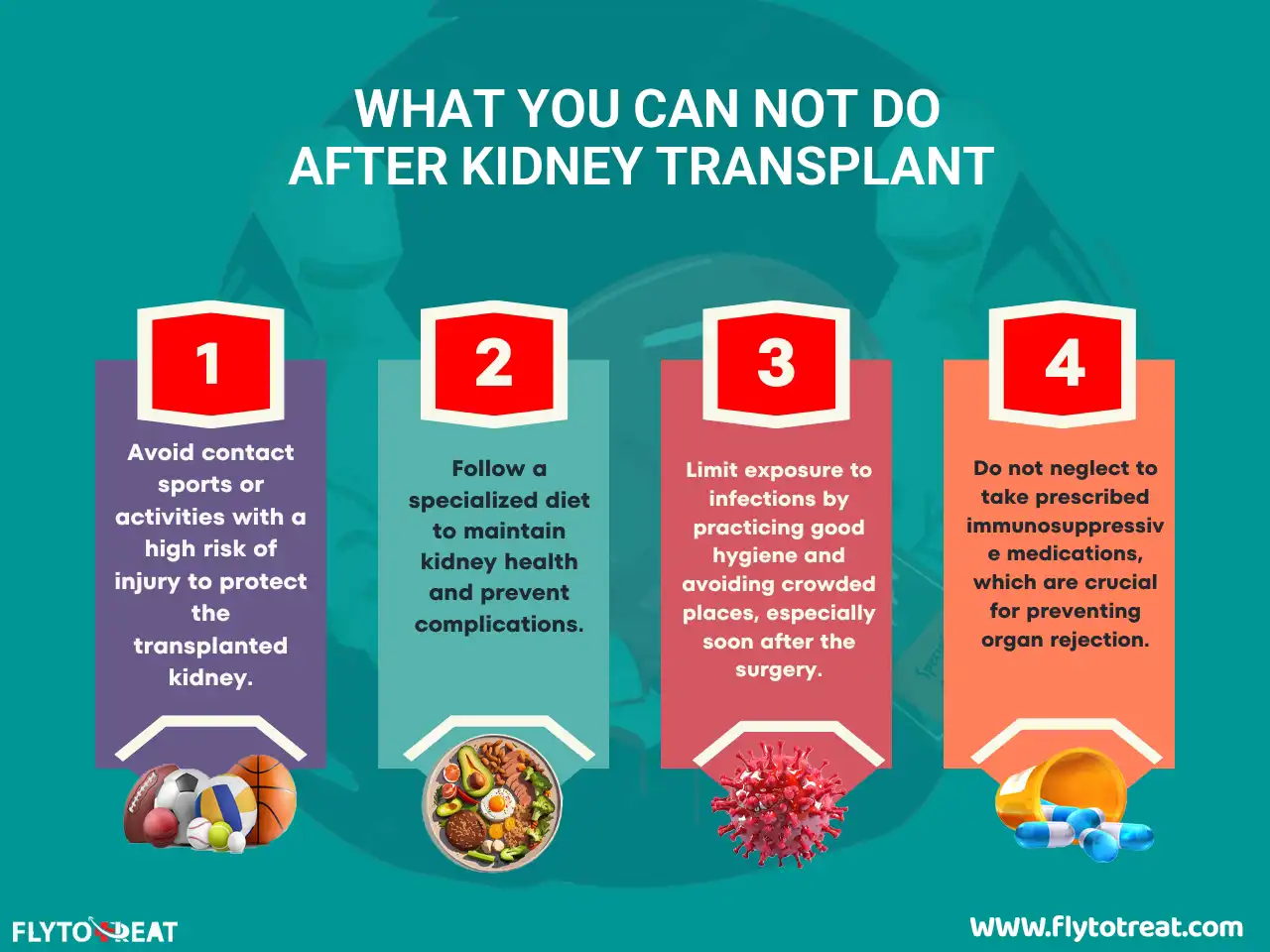
How long can a person survive after a kidney transplant?
Understanding the life expectancy after a kidney transplant is crucial for both patients and their families. This article, brought to you by FlyToTreat, aims to provide comprehensive insights into various aspects of kidney transplant life expectancy. We will address questions such as "How long can a person survive after a kidney transplant?" "What can you not do after a kidney transplant?" and "Why do kidney transplants only last 10 years?" Through this guide, we aim to provide clear and valuable information on these important topics.
How long can a person survive after a kidney transplant?
A kidney transplant offers a significant boost to life expectancy compared to staying on dialysis. Compared to dialysis, a kidney transplant can significantly increase your life expectancy. On average, a kidney transplant from a living donor can extend life by 20-25 years, while a deceased donor kidney can extend life by 15-20 years.

Beyond just quantity of life, a transplant often translates to a better quality of life. You may experience increased energy levels, improved overall health, and greater freedom from dialysis restrictions. All that said, age, overall health, and kidney transplant survival rates vary depending on the organ source and your body's response to the transplant.
Consult our consultants at Flytotreat for a personalized assessment of your life expectancy after a kidney transplant. They can consider your specific health factors to provide a more accurate picture.
Life expectancy after donating a kidney
The generous act of donating a kidney doesn't remarkably impact your own life expectancy. Studies show that healthy kidney donors actually tend to have survival rates similar to the general population. This is because your body can function perfectly well with just one healthy kidney. Studies show that living kidney donors may live longer than the general population. For example, a 1997 Swedish study found that 85% of kidney donors were still alive 20 years after donation, compared to the expected survival rate of 66%.
What can you not do after a kidney transplant?
After a kidney transplant, there are certain activities and habits that recipients should avoid to ensure the longevity of the transplanted kidney and maintain overall health. Here are some important considerations:
• Avoid contact sports or activities with a high risk of injury to protect the transplanted kidney.
• Follow a specialized diet to maintain kidney health and prevent complications.
• Limit exposure to infections by practicing good hygiene and avoiding crowded places, especially soon after the surgery.
• Do not neglect to take prescribed immunosuppressive medications, which are crucial for preventing organ rejection.
*To explore more details about What medicine to take after kidney transplant? feel free to click this link
It is essential to avoid activities that may harm the transplanted kidney. The National Kidney Foundation emphasizes the importance of taking immunosuppressive medications. We advise patients to monitor their health and diet carefully. FlytoTreat highlights the significance of dietary restrictions in supporting kidney function. You can read our full article about diet for kidney transplant patients here. Kidney transplant patient life expectancy can be significantly improved by adhering to these guidelines and avoiding risky behaviors.

Why do kidney transplants only last 10 years?
Kidney transplants often last about 10 years due to several factors. Over time, the body's immune system may begin to recognize the transplanted kidney as foreign, leading to chronic rejection despite the use of immunosuppressive drugs. The natural aging process of the kidney can also impact its longevity, as transplanted organs may age faster than native ones. Additionally, underlying conditions such as diabetes and hypertension can affect the transplanted kidney's lifespan.
These factors contribute to the average kidney transplant lifespan being around 10 years. Improving life expectancy after renal transplant remains a key focus, with ongoing research aiming to extend the life expectancy post-kidney transplant and improve the kidney transplant 10-year survival rate.
What percentage of kidney transplants fail?
The failure rate of kidney transplants varies, but several factors influence these rates. Approximately 10-20% of kidney transplants face rejection within the first year, a common issue arising when the immune system attacks the new kidney. This rejection can be acute or chronic, with the latter occurring over many years. Chronic rejection and other medical complications can affect the kidney transplant longevity.
• Acute rejection: Occurs in about 10-15% of cases within the first year.
• Chronic rejection: This can gradually affect the kidney over time.
Understanding and managing these risks can significantly impact the life expectancy after kidney transplant. Continuous advancements in immunosuppressive therapies aim to improve the kidney transplant 10-year survival rate, enhancing the life expectancy post kidney transplant and overall outcomes for recipients.
Kidney transplant death rate
The death rate after a kidney transplant is influenced by various factors, including the patient's overall health, age, and post-surgery complications. Studies show that the mortality rate for kidney transplant recipients ranges from 3% to 5% within the first year, with the risk declining over time. Significant causes of death include cardiovascular disease, infections, and malignancies.
Advancements in medical care have improved kidney transplant longevity, contributing to a better life expectancy post kidney transplant. Monitoring and management are crucial for optimizing outcomes and extending the life expectancy after kidney transplant.
Conclusion
Kidney transplants significantly enhance both the lifespan and quality of life for recipients. Although there are challenges and limitations, including the typical 10-year lifespan of a transplanted kidney and necessary lifestyle adjustments, the benefits often outweigh the risks. FlyToTreat is dedicated to helping you understand these complexities and providing support throughout the journey. By following medical advice and maintaining a healthy lifestyle, recipients can optimize their kidney transplant longevity and overall well-being.
MEDICALLY REVIEWED BY: Dr. Ali Bazazi
AUTHOR: FlytoTreat's team of Authors
17 July 2024 - Updated At: 02 November 2024
Related Articles
I'm a kidney transplant person An so Far my kidney has lasted me 25 yrs. So your saying that my Transplant Won't last me, My Entire life span at Some point I'll be back on the Machine for the remainder of my life. Is that what I'm understanding You to say?
Comment





